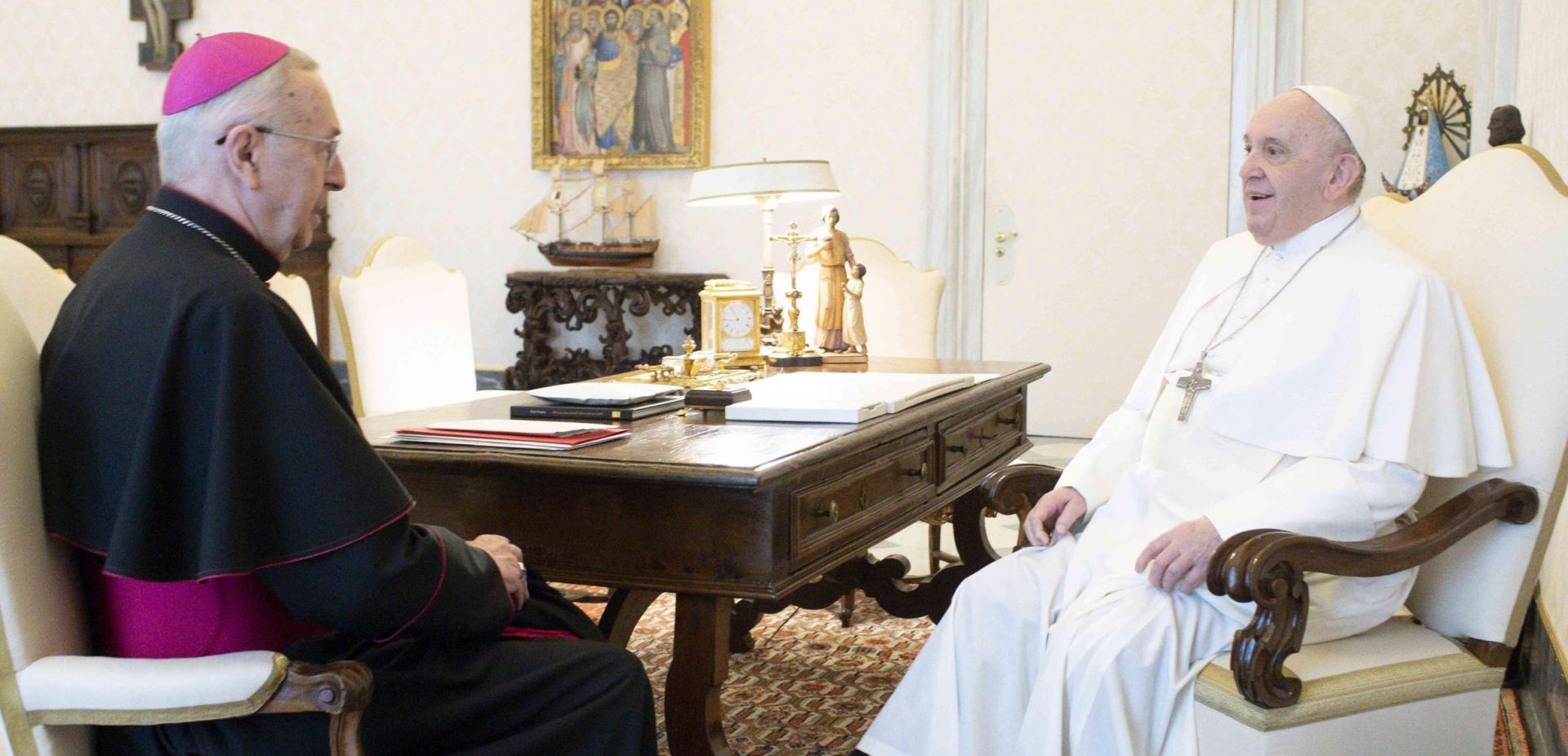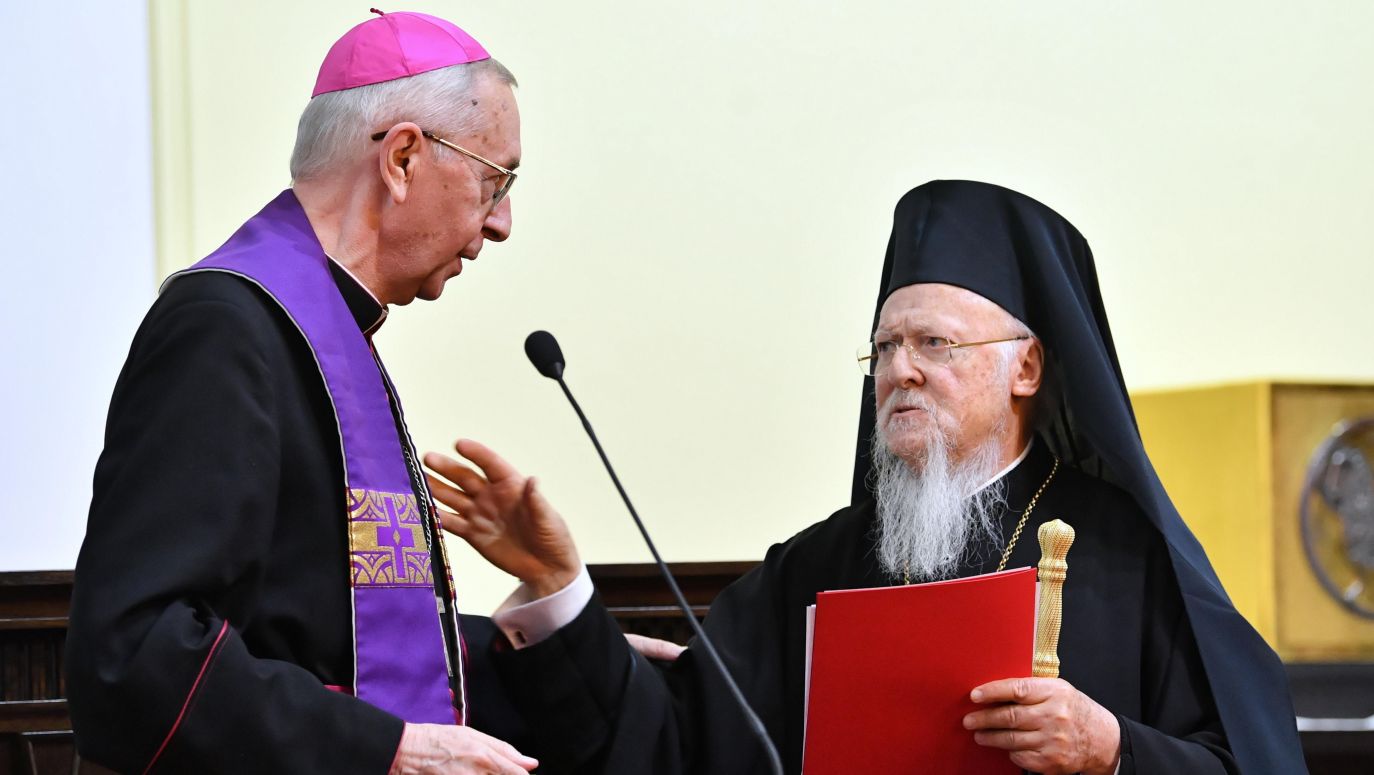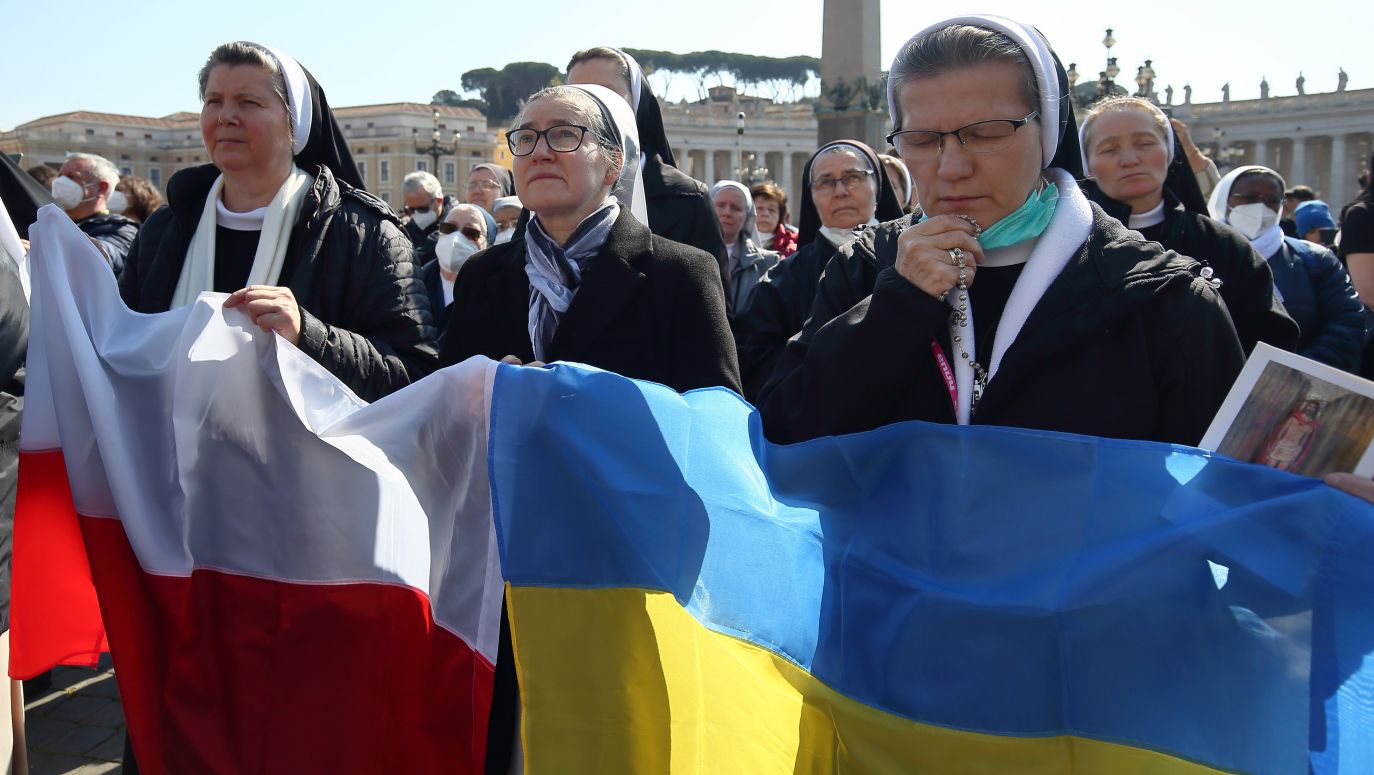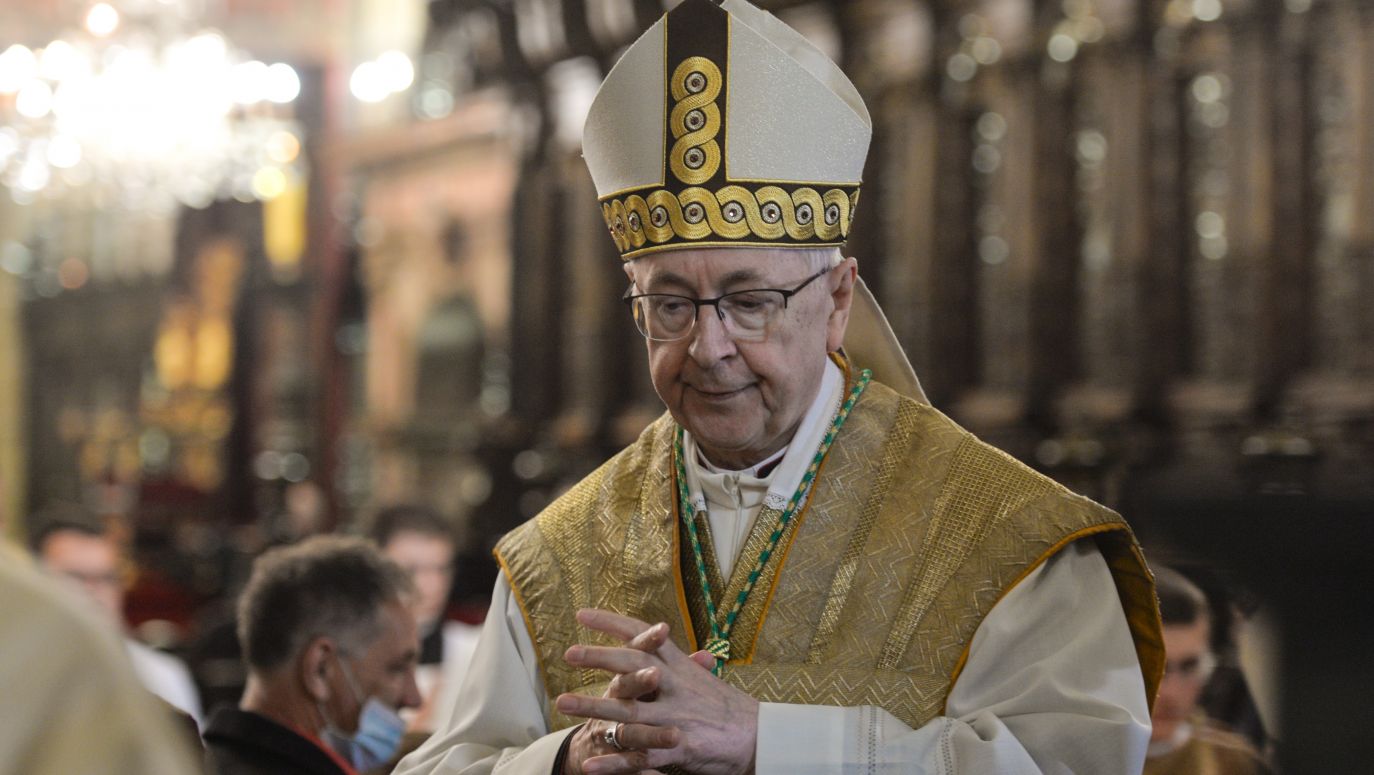The devilish face of war
13.04.2022
I presented the Holy Father with a study on the unfortunate effects of the Vatican's Ost-Politik towards the Churches in Central and Eastern Europe. The sympathy of Vatican diplomacy for Russia is probably derived from a similar state of mind that prevails in Italy and France, which did not experience the rule of communist dictatorship on their own skin,' says Archbishop Stanisław Gądecki, President of the Polish Bishops' Conference, Metropolitan of Poznań.
TVP WEEKLY: Archbishop, we are talking to you shortly after your return from the Vatican. How has the Holy Father received your reports and opinions concerning the involvement of the Church in Poland and you personally in the Russian aggression against Ukraine?
ABP STANISŁAW GĄDECKI: The Catholic Church in Poland has taken an unambiguous stance condemning the aggression of the Russian Federation against Ukraine. Since it began, thousands of innocent people have been killed, including many children, old people, women and men who had nothing to do with military action. Many of the actions of the aggressor bear the hallmarks of genocide. Some towns and villages were razed to the ground, hospitals and schools were bombed. All this happened a century after the establishment of the godless Soviet empire and seventy-seven years after the end of the Second World War.
In regard to this aggression, I addressed the following words to His Holiness Kirill Patriarch of Moscow and All Russia: "No reason, no rationale ever justifies the decision to launch a military invasion of an independent country, to bomb residential areas, schools, kindergartens or hospitals. War is always a defeat for humanity. This war (...) is all the more pointless because of the proximity of the two nations and their Christian roots. Is it permissible to destroy the cradle of Christianity on Slavic soil, the place where Rus was baptised?
The invasion of Ukraine will do the Russian Federation more harm than good. I am thinking first of all of the thousands of Russians who will pay for this war with their lives, but also of the image of Russia as an aggressive, unpredictable and threatening player in international relations. Russia will irreparably damage its good name.
The Pope received the news about the involvement of the Church and Poles in the aid effort with great joy. He is very impressed by the openness and generosity of our compatriots, who until now have been spoken of mainly from the perspective of the situation on the Belarusian-Polish border. I took the opportunity to explain to Pope Francis the difference in the attitude of Poles towards war refugees from Ukraine (mainly women and children) and economic migrants (mainly young men) from various countries, who - having the opportunity to cross the Polish border legally - resort to forcing it illegally, in violation of EU law. Meanwhile, it is precisely controlled migration processes that give a sense of security, as opposed to chaotic migration managed by gangs of smugglers and the inhumane delusion of getting to a dreamed paradise in Europe.
However, it is worth remembering here the Pope's words: "migrants and refugees are not pawns on the chessboard of humanity. They are children, women and men who leave or are forced to leave their homes for various reasons, who have the same legitimate desire to know more, but above all to be more" (Message for World Migrant and Refugee Day, 2014). While respecting state and international legislation, we are obliged to meet their aspirations.
In your opinion, is the idea of a just war still relevant? How, in terms of morality, to treat the fact that Ukrainians - and volunteers from other countries, including Poles - are shooting and killing Russians? After all, they could have stopped and retreated, sparing their lives, their families and the lives of enemy soldiers. Perhaps that would be a more Christian attitude?
The concept of just war has a long history. Today's teaching of the Catholic Church has made significant progress on the issue of war compared to Old Testament times.
Many people on this occasion misinterpret the fifth commandment of the Decalogue, 'Thou shalt not kill'. It does not refer to the prohibition of war, but to the prohibition of murder, as indicated by the Hebrew word 'rāşah' used here. The correct translation should read: "You shall not murder" (Genesis 20:13). It seems that the choice of this word is not accidental, as it differs from the word "harag", meaning to inflict death in war, and from the Hebrew "hemit", meaning to condemn to death or execute criminals, which was once acceptable. The use of the word 'rāşah' indicates the shedding of innocent blood, the deliberate, premeditated causing of the death of a fellow human being.
The creator of the just war theory is St. Augustine (354-430), who stated that war in itself is neither good nor bad. Its moral judgement is determined by the motive of the combatants. According to Augustine, Christ's call not to respond to evil with evil is not a condemnation of every war. He considered a war waged for a just cause to be a just war. At the same time, he stressed the need to condemn all abuses of warfare. He stressed that wars must not be fought with love of violence, cruelty and hatred. He argued that war is a punishment for human sins, and participation in it represents a sad but real necessity for Christians. And so he developed the theory of a just war, that is, a war fought to defend or redress a wrong. For a war to be considered just, it must fulfil the following conditions: it must be waged by a legitimate authority, and its cause must be just. The aim of a just war is to punish evil and to restore peace.
The Catechism of the Catholic Church (CCC 2308) speaks of the right to use military force. The document lists four points as conditions for the use of military force: first, the damage done by the enemy must be really long-lasting, serious, and certain. Secondly, military force may only be used when all other available means have been exhausted. Third - there must be serious conditions for success, so that the military action does not cause even greater evil than the original one. Fourthly and finally, the use of arms must not cause more serious damage and endanger innocent people.
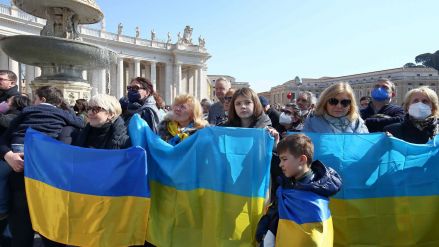
Will Francis choose to make such an act of support for a Ukraine attacked by Russia?
see more
The just ones include above all defensive wars, based on the assertion of rights or the redress of grievances, from which the necessity of maintaining an army arises. "Those who devote themselves to the cause of the fatherland by serving in the army are servants of the security and freedom of nations. If they fulfill their task properly, they truly contribute to the common good of the nation and to the consolidation of peace" ("Gaudium et spes, 79"; CCC 2310)
Today, however - in the statements of Pope Francis - the harsh criticism of the "just war" theory recurs repeatedly. "Wars are always unjust" - says the Pope. "In the past, even in our Churches, we used to speak of a holy war or a just war. Today we cannot speak like that. A Christian awareness of the importance of peace has developed.”
And why such a change? The answer must be sought in the text of the encyclical "Fratelli tutti". "It is so easy to choose war, using all kinds of excuses, ostensibly humanitarian, defensive or preventive, resorting also to the manipulation of information. Indeed, in recent decades, all wars have been supposedly 'justified'. The Catechism of the Catholic Church speaks of the possibility of legitimate defence by the use of armed force, which means showing that certain "strict conditions of moral entitlement" exist. However, it is easy to fall into an overly broad interpretation of this legitimate possibility. It also attempts to justify 'pre-emptive' attacks or acts of war, which easily entail 'more serious evils and confusion than the evil to be removed'. The point is that since the development of nuclear, chemical and biological weapons, and the vast and increasing possibilities offered by new technologies, war has been given an uncontrollable destructive power that strikes many innocent civilians. Truly 'humanity has never had so much power over itself and there is no guarantee that it will use it well'. We can therefore no longer think of war as a solution, since the risks will probably always outweigh the hypothetical utility attributed to it. Faced with this situation, it is very difficult today to maintain the rational criteria that were developed in previous centuries to speak of the possibility of a "just war". No more war!" - writes the Pope in the encyclical "Fratelli tutti".
How is the Church in Poland coping with the unexpected influx of refugees, how does the Archbishop assess the condition of Polish parishes in this respect?
The Church is currently taking a very important test of her sensitivity to the weakest. As far as I know, people in the Church - both clergy, religious orders and lay people - are trying to meet the new challenges through Caritas Polska, diocesan Caritas, retreat houses, parishes, religious orders and private individuals. Rather than speak of helping refugees from Ukraine throughout the country, as Caritas Poland can speak of, let me give you an example in just one diocese, the archdiocese of Poznan (MTP):
• Collections at churches - PLN 3 million;
• Collection for Caritas Poznań - over PLN 600 thousand;
• Collection of donations in more than 140 parishes of the Archdiocese;
• Donation warehouse at the Parish of the Visitation of the Blessed Virgin Mary in Poznań - distribution of aid is ongoing;
• The warehouse at MTP was open until the end of March and was run by volunteers and workers from Caritas, the MTP Group and the ZHR Scouts, with around 350 people helping out daily;
• The reception desk at MTP - coordinated by the Caritas Volunteer Service of the Archdiocese of Poznań - operates around the clock in pavilion number 2;
• The number of people who passed through the Reception Point - 23,324 people;
• Number of volunteers accepted to help at the Reception Point - 1514 people (including interpreters, volunteers, psychologists, children's entertainers);
• On average, 35 interpreters, 5 leaders, 38 volunteers work at the Reception Point per day;
• There is also a psychological helpdesk where therapists who have volunteered as part of Caritas' voluntary service are on hand.
• In addition, our volunteers also support the operation of Hall 7/7a - there are 4 leaders here.ów oraz każdego dnia 25 wolontariuszy;
• Transports were sent to Ukraine - 2x to Kharkov, Odessa, 2x to Berdychiv, Lviv, Czernichów, Truskavets, Sambor parishes, Lutsk (7 buses), 1x to Kyiv University;
• Paczka dla Ukrainy (A parcel for Ukraine) - an action which started in parishes (special cardboard boxes with a list of products to be filled with are given to refugees who ask for help);
• From 6.04 the Help Centre for Migrants and Refugees in Pamiątkowa Street (activities for children and young people, language courses) will be launched;
• Some 4,500 refugees are housed in diocesan buildings, in Caritas premises and with families in the parishes of the archdiocese;
• A leaflet is being prepared in Ukrainian on the possibility of receiving the Holy Sacraments;
• We are planning to prepare summer holidays for Ukrainian children (trips, summer camps, holiday camps;
• Assistance provided on an ongoing basis at soup kitchens and Caritas Headquarters;
And what about the many Polish priests working in Ukraine or other countries of the former Soviet camp, including Russia? What support do they receive?
Father Leszek Kryza, who is responsible for Aid to the Church in the East, said that currently 198 diocesan priests, 387 religious priests, 320 Polish sisters and 40 religious brothers and lay volunteers serve the Church in the East. Thanks to the funds collected during the Day of Prayer and Material Assistance to the Church in the East, it is possible, among other things, to renovate churches and catechetical halls, provide summer holidays for children and young people, support senior citizens' homes and single mother's homes, canteens and kitchens run by nuns and religious brothers for children, the elderly and the poor. In addition, priests working in Ukraine or other countries of the former Soviet camp also receive support from Polish parishes, which they visit, preach the word of God and collect donations for their upkeep, the upkeep of parishes and parish institutions.
Do Catholics in Russia dare to speak out against aggression, or do they not want to put themselves - and the interests of the Church there - at risk?
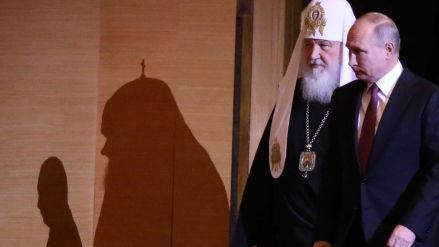
The criticisms made against St. John Paul II by the writer Józef Mackiewicz, might come as a surprise.
see more
I do not believe that speaking out against Russian aggression by Catholics in Russia will make any difference to the lack of democracy in that country. An example is the Orthodox Father Alexander Mień, who died in unexplained circumstances on 9 September 1990 near Moscow. According to the official version, he was murdered by one of his parishioners. Others say he was killed by KGB or GRU officers. His son, Nikolai, said: "My father was an embodiment of the spiritual values of Christianity completely unacceptable to the party of power. By 1990 he had gained fame throughout Russia and enjoyed an ever-growing authority. He posed a real threat to the communist government". Besides, there are very few Catholics in Russia. In a dictatorial system - with full media control - I doubt that this would contribute to a change for the better, but it would give the opportunity to destroy the Catholic Church and to demolish its structures. Protesting against aggression is primarily a task for people and media outside Russia's borders.
You were one of the first bishops to write a letter to the Patriarch of Moscow, Kirill, appealing for a halt to Russian aggression. How did other European bishops receive it? Did they talk to you?
Following my two letters to Moscow's Patriarch Kirill, many bishops and Catholic organisations have sent letters along similar lines. In order to 'show goodwill for seeking a diplomatic solution to the conflict, based on dialogue, common sense and respect for international law', the President of the Commission of European Bishops' Commissions (COMECE), Cardinal Jean-Claude Hollerich of Luxembourg, appealed to Patriarch Kirill. I think other bishops have taken the courage to call the war explicitly a satanic act, although other letters have not gone as far as my request to the Patriarch to encourage Russian soldiers to refuse to take part in this war. This letter did not necessarily result in a speech by Patriarch Kirill giving this war a religious dimension or mystical dimension. This is probably the reason for Pope Francis' cautious statements on the aggression of the Russian Federation, which could be understood as a declaration of the same kind of war by the Catholic Church.
How was this letter of your Archbishop received by Vatican diplomacy, whose ignorance in the matters of Central and Eastern Europe is probably - with the exception of the pontificate of John Paul II - traditional? In Poland, we remember that the November Uprising was condemned by the then Pope, we remember that Primate Stefan Wyszyński had to act independently of the Vatican diplomats, because they still wanted to communicate with the communists. How do you move in these meanders?)
I do not know how this letter was received by Vatican diplomacy. It could have been perceived as meddling in matters that were not mine area of expertise, because international affairs are the responsibility of the Secretariat of State. The 'Letter of the Polish Bishops to the German Bishops' was rather an exception.
It seems to me that Vatican diplomacy - in conflicts between countries where Christians are fighting on both sides - is trying to remain neutral, without choosing one particular party in the conflict. This is its main difficulty.
During my meeting with Pope Francis, I took the liberty of giving the Holy Father an extensive study on the unfortunate consequences of the Vatican's Ost-Politik in relation to the Churches in the countries of Central and Eastern Europe. I believe that the opinion of Blessed Cardinal Stefan Wyszyński on this matter was correct, and therefore after the election of St. John Paul II the direction of Vatican diplomacy on this matter changed dramatically. It is likely that the sympathy of Vatican diplomacy for Russia stems from a similar state of mind that prevails in Italy and France, which did not experience the rule of communist dictatorship on their own skin.
What for the Catholic world means the unexpected visit of Patriarch Bartholomew to Poland? What for Vatican diplomacy?
The visit by Patriarch Bartholomew of Constantinople - the spiritual leader of some 300 million Orthodox Christians worldwide - had a dual purpose for me. On the one hand, it served to condemn Russian aggression. The Patriarch called very early on for an end to the war and an immediate halt to all acts of violence; anything that spreads pain and death. He called the war repugnant and expressed solidarity and support for the Ukrainian Church, independent of Moscow, and the 'suffering Ukrainian people'. The Patriarch showed the authentic face of Orthodoxy, which - in accordance with the Gospel - condemns the war. On the other hand, this visit was a confirmation of his closeness to the war refugees from Ukraine. What this visit was for Vatican diplomacy I do not know, as I am not a Vatican diplomat. I suppose that in Pope Francis' eyes it was a strengthening of the ties between the Vatican and Constantinople.
What can the good that has come about in connection with the refugees result in the future? A greater closeness with the faithful of the Greek Catholic Church? With the Orthodox?
It certainly is. I see this in the situation that has arisen in our Diocese of Poznan. In addition to lay refugees, clerical refugees have come to us, together with their families. This gave us the opportunity, with the approval of the Polish Greek Catholic bishops, to establish a pastoral ministry in Ukrainian for Greek Catholics, to celebrate liturgies and confessions in Ukrainian. At the request of the Polish Orthodox bishops, we opened places for Orthodox liturgy in Roman Catholic churches, on the assumption that the good of souls - "suprema lex".
– interviewed by Barbara Sułek-Kowalska
– translated by Tomasz Krzyżanowski
